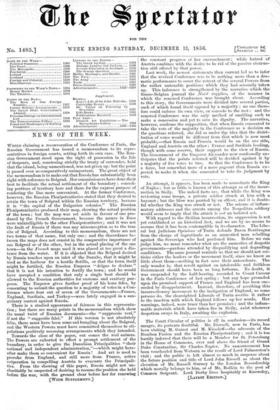NEWS OF THE WEEK.
Wit= claiming a reconvocation of the Conference of Paris, the Russian Government has issued a memorandum to its repre- sentatives in foreign courts, setting forth its own case. The Rus- sian Government stood upon the right of possession in the Isle of Serpents, and, construing strictly the treaty of surrender, held that the island, being unmentioned, was not given up: but the point is passed over as comparatively unimportant. The great object of the memorandum is to make out that Russia has substantially been right with reference to Bolgrad. Her commissioners have done their best to facilitate the actual settlement of the boundary ; conced ing portions of territory here and there for the express purpose of rendering the line more convenient. At the former Conference, however, the Russian Plenipotentiaries stated that they desired to retain the town of Bolgrad within the Russian territory, because it is " the capital of the Bulgarian colonies." The Russian Plenipotentiaries produced their map, showing the actual position of the town ; but the map was set aside in favour of one pro- duced by the French Government, because the names in Russ were unintelligible to the other Plenipotentiaries; and it was not the fault of Russia if there was any misconception as to the true site of Bolgrad. According to this memorandum, there are not two towns of that name, but only one ; and the discordance be- tween the maps does not consist in the comparative importance of one Bolgrad or of the other, but in the actual placing of the one town—in the French maps used it was placed at too great a dis- tance from the water. If it is objected that the Bolgrad desired by Russia touches upon an inlet of the Danube, that it might be used as the harbour for a hostile flotilla, or that the town itself- might be fortified, the Russian Emperor " deigns to declare " that it is not his intention to fortify the town ; and he would have accepted a condition that only a single boat should be allowed to the Russian authorities for customs and sanitary pur- poses. The Emperor gives further proof of his bona fides, by consenting to submit the question to a majority of votes in a Con- ference where four out of seven of the Governments—France, _ England, Sardinia, and Turkey—were lately engaged in a. san- gainary contest against Russia.
There is a studied appearance of fairness in this representa- tion; but there are many points in the memorandum which show the usual twist of Russian documents—the " suppressio veri," if not the " suggestio falsi." If this version is not absolutely false, there must have been some sad bungling about the Bolgrad, and the Western Powers must have committed themselves to sti- pulations positively reversing arrangements which they intended.
Towards the close of the paper, out comes the real animus. The Powers are exhorted to effect a prompt settlement of the boundary, in order to give the Danubian Principalities " their national and independent administration,"—which might here- after make them so convenient for Russia! And art is used to provoke from England, and still more from France, active cooperation in compelling Austria to evacuate the Principali- ties. From the showing of this paper, Russia might not un- charitably be suspected of desiring to resume the position she held before the war, with the ground clear before her for renewing the constant progress of her encroachment ; while hatred of Austria combines with the desire to be rid of the passive obstruc- tion still offered by that power.
Last week, the newest statements then current led us to infer that the revived Conference was to be nothing more than a dra- matic performance to cover the retreat of the several Powers from the rather untenable positions which they had severally taken up. This inference is strengthened by the narrative which the Russo-Belgian journal the Nord supplies, of the manner in which the renewed Conference was brought about. According to this story, the Governments were divided into several parties, each of which found itself opposed by a majority ; no one there- fore could enforce its own view, or concede to the rest ; and the renewed Conference was the only method of enabling each to make a concession and yet to save its dignity. The narrative, however, confirms the supposition, that when Russia consented to take the vote of the majority in the Conference as a decision on the questions referred, she did so under thp idea that the distri- bution of votes would be different from that which is now most probable,—that Russia and Prussia would be on the one side, England and Austria on the other ; France and Sardinia lending, though with some reserve, their support to the view of Russia. The Government of the Emperor Alexander now confessedly an- ticipates that the points referred will be decided against it by a majority of fiye votes to two. So that the Conference is to be a farce, but somewhat more of a mere pageant than Russia ex- pected to make it when she consented to take its judgment by vote.
































